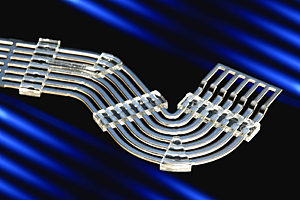Sep 23 2007
BASF has developed a new engineering plastic that markedly reduces the risk that electronic components will malfunction due to contact with moisture or oil. The electrical conductive paths of these components can easily be overmolded with the plastic to form a tight seal. This new material is a transparent, non-reinforced copolyamide (PA) that goes by the name Ultramid® Seal-Fit. It stands out for its very good adhesion to metals on the one hand and to plastics such as Ultramid (PA) and Ultradur® (PBT) on the other hand. This product has been specially developed for the tight overmolding of metal inserts, thus accounting for an optimal bond in the component. Many approval samples have already been successfully tried out and the first serial applications are in the planning stage. The material is now already available in commercial quantities.
Injection molding instead of gluing or pre-coating
Until now, the limited adhesion of the housing plastic to the metal as well as the differing thermal expansion of these two materials have made it difficult to attain a really tight covering of metal inserts. Complicated sealing methods involving silicone adhesives, hot melts, impregnation or pre-coating of the metal were necessary. Thanks to Ultramid Seal-Fit, a tailor-made technical solution is now on hand that can be completely implemented via injection-molding technology.
 Overmolding of metal inserts with Ultramid® Seal-Fit.
Overmolding of metal inserts with Ultramid® Seal-Fit.
Tight overmolding: sealing by means of injection molding in two steps
In the first step, the material insert is partially premolded with a precise fit and subsequently, in the second step, conventionally overmolded with a classic housing plastic such as Ultramid A3EG6 or Ultradur B4300 G6. Wherever metal inserts are premolded anyway, the first process step even offers an additional benefit: with Ultramid Seal-Fit, the electrical conductive paths are not only affixed in place but also tightly sealed at the same time.
Metal parts thus overmolded are sufficiently sealed against water, oil and gas, as the experts of the Plastics Institute in Lüdenscheid, Germany have demon¬strated in comprehensive temperature-shock tests on special test components. Among all of the other materials tested, this new BASF plastic best meets the requirements of the automotive industry. Application areas are sophisticated mechatronic components such as transmission and brake controls, sensors and plug-in connectors, especially in automotive construction.